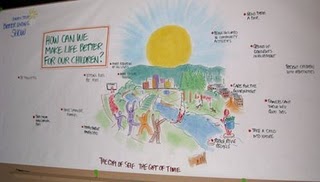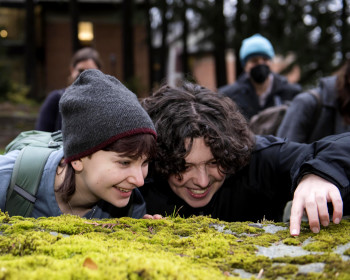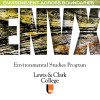Rethinking environmentalism…
Open gallery

April 2, 2009
Last weekend I attended the Regional Innovation Forum, a two-day conference on environmental issues in Portland sponsored in part by Focus the Nation, Lewis & Clark, and several regional environmental organizations. The Forum focused specifically on addressing smart energy solutions, social innovation, sustainability in schools and climate change. The Forum’s primary objective, and primary accomplishment in my view, was to bring together leaders and advocates in the environmental community who would not otherwise cross paths to coordinate and share ideas for increasing sustainability in the region.
The conference was broken down into three groups, or “tracks,” to focus on energy solutions, social innovation, or sustainability in schools. I chose the social innovation track, which focused on innovative projects and examples of “social entrepreneurship” in the region. A presentation about the 2006 Nobel Peace Prize winner Muhammad Yunus resonated with me because – as phrased by a documentary on his work on microcredit in Bangladesh – he was not “turning things upside down; he was turning them rightside up.” This is a perfect turn of phrase for what so many environmentalists perceive their role in the world to be, myself included. We have radical ideas about how to change the world, but we aren’t trying to turn the world on its head.
By now, nearly everyone is familiar with an environmental footprint: the negative impact that our everyday actions have on the planet. In contrast, the Forum introduced to me the idea of an environmental handprint: the positive impact one makes on the environment, and the good one does to reverse environmental inequality. In a field that has a tragic tendency to wax negatively about global crises, destruction, and our imminent demise, the environmental handprint is refreshingly inspiring. We should be thinking about what we can do, not what we can’t do. Sitting in the Expo Center surrounded by environmental advocates, I was touched by how many people were focusing not only on reducing their footprint, but increasing their handprint. Instead of collapsing under the weight of our environmental problems (as I am often tempted to do), there are people all across the country and the world who have taken a tiny piece of the environmental puzzle and embraced the challenge of trying to put it back together.
In fact, there was no mention of the buzzwords that usually follow environmentalists; no one talked about limits, destruction, regulation, or crisis. The social entrepreneurs who presented projects were overwhelmingly optimistic about solving our environmental problems. They are working on increasing their environmental handprints, rather than panicking about our ecological footprint. I think there is a terrible shortage of optimism in current environmental thinking. Everyone has something to contribute to the world. Things so simple as pet rescue projects, community gardens, and projects like The ReBuilding Center (http://www.rebuildingcenter.org/) have positive impacts on the world, and contribute to the kind of positive, innovative environmental change we need.
More Environmental Studies Stories
Environmental Studies is located in room 343A of John R. Howard Hall on the Undergraduate Campus.
MSC: 62
email envs@lclark.edu
voice 503-768-7790
fax 503-768-7620
Symposium Advisor Jessica Kleiss
Environmental Studies
Lewis & Clark
615 S. Palatine Hill Road MSC 62
Portland OR 97219


